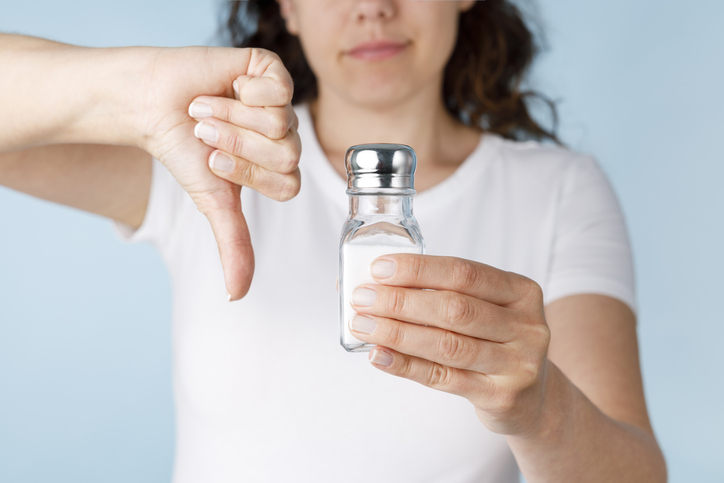12 Ways to Get Rid of Bloating
Bloating is often associated with your hormones, but it could be something else so check whether any of these apply to you.

Bloating is very common, with from 16–31% of the general population affected, and at Menopause it is particularly common.
Fortunately, it’s generally a short-term problem that resolves on its own, but for some, bloating is a chronic problem that causes moderate to severe symptoms and negatively affects quality of life.
Bloating is triggered by many dietary and lifestyle factors, so it’s best to identify the cause to reduce or eliminate symptoms. Here is here to start.
1. Identify the cause of bloating
Sounds obvious doesn’t it, but it is not always clear just what the cause might be.
Could it be gas, as increased gas in the gut can cause increased tension and bloating? Carbon dioxide, nitrogen, and methane are introduced into your gut by swallowing air and the fermentation of foods in your large intestine and this may be due to eating foods that contain compounds that are fermented in your colon.
These include fibre, sugar alcohols, and FODMAPs or it could also be any of these:
– food intolerance, such as lactose or fructose intolerance
– swallowing excess air
– increased fluid in your bowels
– constipation
– imbalances in your gut microbiome, or the ecosystem of bacteria living in your gut
Also, stress, anxiety, high fat meals, weight gain, and hormonal changes during the menstrual cycle and Menopause are linked to bloating too.
Some people also experience this condition due to muscle reflexes in the abdominal wall and diaphragm.
In rare circumstances, bloating may be a symptom of a medical problem so if you have chronic, unresolved bloating, it’s important to seek medical advice to treat the underlying cause.
2. Limit foods that trigger bloating
Many people experience bloating after eating certain foods that contain high amounts of nondigestible or poorly digestible compounds.
These compounds include insoluble and soluble fibres, sugar alcohols, and the sugars raffinose and fructose.
When you eat foods containing these compounds, the undigested fibre and sugars end up in your large intestine where bacteria ferment them, leading to increased gas.
Specific foods that may cause bloating include:
– Vegetables: broccoli, cauliflower, Brussels sprouts, and cabbage
– Fruit: prunes, apples, pears, and peaches
– Whole grains: wheat, oats, wheat germ, and wheat bran
– Legumes: beans, lentils, peas, and baked beans
– Sugar alcohols and artificial sweeteners such as aspartame: plus xylitol, sorbitol, and mannitol are found in artificial sweeteners and sugar-free chewing gum
– Drinks: all carbonated drinks, including water
While these foods may lead to increased gas, not everyone will feel bloated after having them.
Keeping a food diary may help you identify which foods cause your symptoms so that you don’t have to follow an overly restrictive diet. Once you have identified them you can start by eliminating completely and slowly reintroduce them to test your sensitivity.
3. Check for lactose intolerance
Lactose is a sugar found in milk and your body needs an enzyme called lactase to break it down.
However, most people don’t produce enough of this enzyme to break down lactose once they reach adulthood. The resulting condition is called lactose intolerance.
This condition causes lactose to pass through your gut, pulling in more water until it reaches your colon, where it’s fermented by bacteria and releases gas. This may lead to symptoms like bloating, stomach pain, increased flatulence, and belching.
If you suspect you have lactose intolerance, reducing your dairy intake may help eliminate symptoms of bloating.
However, it’s important to rule out other causes before making any significant changes to your diet, as dairy is an important source of key nutrients like calcium, vitamin D, magnesium, potassium, zinc, phosphorus, and protein.
Fortunately, some dairy foods are lower in lactose and may be better tolerated. These include Greek yoghurt and aged cheeses.
Additionally, many lactose-free dairy products allow you to reap the benefits of dairy without the symptoms of lactose intolerance.
4. Alleviate constipation
Constipation affects about 14% of people worldwide, causing symptoms like infrequent bowel movements, excessive straining, hard stools, and bloating.
In particular, it can lead to bloating because the nondigestible components of food spend longer in your colon and are thus subject to more fermentation by bacteria.
Often, you can improve symptoms of constipation by:
– Increasing your fibre intake. Aim for 18–30 grams per day of both soluble and insoluble fibre from whole grains, fruit, vegetables, nuts, and seeds.
– Drinking adequate fluids and 1.5–2 litres is the NHS recommendation per day of water and other fluids.
– Exercising regularly. Walking, jogging, swimming, dancing or cycling for about 30 minutes each day may help keep your bowels moving regularly.
CAUTION!
Keep in mind that you may need to increase your soluble fibre intake with caution, as this type of fibre is fermented in your colon and may contribute to bloated feelings.
Additionally, adding fibre to your diet too rapidly may worsen constipation, so it’s important to increase your intake slowly so aim for an intake of 25 grams per day for women.
While constipation may be relieved with medication, certain types like bulk and osmotic laxatives may make bloating worse, so talk with your doctor about your symptoms to determine what’s best for you.
5. Try a low FODMAP diet
Irritable bowel syndrome (IBS) is a common digestive condition characterised by symptoms like abdominal pain, discomfort, diarrhoea, and constipation.
Approximately 66–90% of people with IBS also experience bloating. Numerous studies show that limiting certain carbs called fermentable oligosaccharides, disaccharides, monosaccharides, and polyols (FODMAPs) may reduce bloating and other symptoms in people with IBS.
Not only are FODMAPs poorly digested and fermented by bacteria in your colon, but they also cause more water to be retained in your bowels.
This is a three-step elimination diet: first, you stop eating certain foods and then you slowly reintroduce them to see which ones are troublesome.
It is best to follow the elimination portion of the diet for only two to six weeks to reduce your symptoms. Then every three days, you can add a high FODMAP food back into your diet, one at a time, to see if it causes any symptoms. If a particular high FODMAP food causes symptoms, then avoid or eliminate this long term.
Foods high in FODMAPs to limit include:
* Dairy-based milk, yogurt and ice cream
*Wheat-based products such as cereal, bread and crackers
*Beans and lentils
*Some vegetables, such as artichokes, asparagus, onions and garlic
*Fruit, such as apples, cherries, pears, peaches, dried fruit
*Vegetables: artichokes, asparagus, onions and garlic, mushrooms, cauliflower, sugar snap peas, and Brussels sprouts
*Nuts: cashews and pistachios
Foods low in FODMAPs to include:
*Eggs and meat
*Cheeses like brie, Camembert, cheddar and feta
*Almond milk
*Grains like rice, quinoa and oats
*Vegetables like aubergine, courgette, potatoes, tomatoes, cucumbers and
*Fruit such as grapes, oranges, strawberries, blueberries and pineapple
6. Try probiotic supplements
Probiotics are live microorganisms, such as bacteria, that provide health benefits when you consume them.
They are available as supplements, but they’re also found naturally in some foods such as yoghurt, kefir, sauerkraut, kimchi, kombucha, miso, and tempeh.
Some studies suggest that probiotics may aid digestive symptoms like bloating by boosting the number and types of bacteria in your gut.
However, the evidence is mixed. Some studies show no effect on bloating compared with dietary changes. Success may depend on the individual, as well as the type of probiotic strains used.
If you try probiotics, choose one type and stick with it for at least 4 weeks to establish whether it has had a positive effect.
7. Eat smaller portions, and limit salty and fatty foods
It’s not rocket science, but clearly eating large amounts of food may contribute to bloating in two ways.
First, large portions may stretch your stomach and lead to the pooling of gases and solids along your gut, causing feelings of fullness and bloating.
Second, if the foods contain nondigestible or poorly digestible carbs, the more that’s in your colon, the more gases your body will produce.
Thirdly, a high salt intake has been found to contribute to water retention in the gut and feelings of bloating.
Finally, high amounts of fats in your intestine may retain gas and increase the sensation of bloating. This may be why people often report feeling bloated after fatty meals.
Reducing your portion sizes and limiting your intake of foods high in salt and fat, such as fried foods, fast food, chips, chocolate, and confectionary, may help reduce symptoms of bloating.
8. Try peppermint oil
Peppermint has a long history as a digestive aid and in supplement form, it has been found to reduce symptoms of bloating and distension in people with IBS.
Personally I find it helpful to have peppermint tea after a meal, rather than the more usual coffee which is more acidic, and even sucking a strong mint can help too.
9. Avoid swallowing too much air
Swallowing excessive amounts of air, known as aerophagia, is a possible cause of bloating, particularly in people with gut disorders like IBS.
If you are naturally a quick eater, slowing down may help reduce air intake.
10. Do light exercise regularly
Exercise may reduce bloating, as it helps eliminate gas from your bowels. Additionally, light exercise has been found to help reduce the feelings of bloating and fullness in your stomach that occur following a meal.
One study in 94 people found that a 10–15-minute walk after a meal improved the feeling of bloating to a greater extent than medication.
Additionally, exercise can aid psychological symptoms like stress, fatigue, and depression, which themselves are linked to digestive symptoms through brain-gut interactions.
11. Combat oestrogen dominance
Unfortunately Menopause sees a shift in hormone production when oestrogen is no longer being produced in the ovaries and so the body shifts production into the fat cells of the belly.
This can result in bloating if hormones are unbalanced.
Helpful information:
Bloating and a ‘muffin top’ are sadly all too common at menopause. To combat excess oestrogen ensure you have adequate progesterone levels as this is the hormone that helps with weight loss and acts as a natural diuretic to help reduce bloating.
If you think you may be oestrogen dominant then a diet specifically designed to combat that would be a good place to start.
The Diet To Help Beat Oestrogen Dominance



















